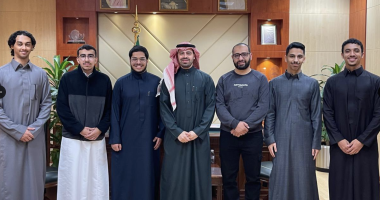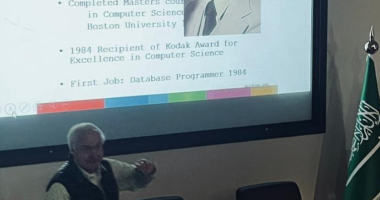Program Information

The department of computer science was established in 1984 with a B.Sc. program to prepare a highly competent creative workforce in the field of computer science. The department, since its inception, has made significant progress. To develop competent professionals in the field of computer science with high moral and ethical values, the program focuses on the following knowledge areas:
- Computer science,
- Basic sciences in Mathematics, Statistics, and Physics,
- Humanities and Social Sciences,
- English Language, and
- Arabic Language and Islamic Culture.
The B.Sc. Program In Computer Science is accredited by the Computing Accreditation Commission of ABET, https://www.abet.org, under the General Criteria and the Computer Science and Similarly Named Computing Programs Program Criteria.
The program satisfies the ACM/IEEE recommendations for a computer science curriculum and takes into account the community needs. The department staff is continuously working on updating the B.Sc. program to meet the latest technologies in computer science and the fastly changing society needs.
Program Educational Objectives
- Graduate will work as computing professionals, conducting research and/or leading, designing, developing, or maintaining computer-related projects in various fields;
- Graduates are capable of demonstrating professionalism and a sense of societal ethical responsibility in all their endeavors.
- Graduates continue enhancing their skills, embrace new computing technologies through self-learning activities, and post graduate training or education.
Table 1 depicts the mapping between the Program Educational Objectives, the corresponding short-term objectives, and the performance indicators defined to measure the attainment level.
Table 1: Mapping PEOs - Actions – Student Outcomes
Program Educational Objectives | Short-term Objectives | Student Outcomes |
|---|
1. Graduates will work as computing professionals, conducting research and/or leading, designing, developing, or maintaining computer-related projects in various fields. | 1.1 To foster students’ intellectual skills by acquiring fundamental knowledge and concepts of computer science and other related sciences. | Apply computer science theory and software development fundamentals to produce computing-based solutions. |
1.2 To nurture students’ creativity skills | Design, implement, and evaluate a computing-based solution to meet a given set of computing requirements in the context of the program’s discipline. |
1.3 To prepare students to the job market competition by strengthening their communication skills and promoting team work. | Function effectively as a member or leader of a team engaged in activities appropriate to the program’s discipline. |
Communicate effectively in a variety of professional contexts. |
2. Graduates are capable of demonstrating professionalism and a sense of societal and ethical responsibility in all their endeavors. | 2.1 To prepare students for professional interaction and leadership. | Recognize professional responsibilities and make informed judgments in computing practice based on legal and ethical principles. |
3. Graduates continue enhancing their skills and embrace new computing technologies through self-learning activities and post-graduate training or education. | 3.1 To promote student’s commitment to self-study and life-long learning. | Analyze a complex computing problem and to apply principles of computing and other relevant disciplines to identify solutions. |
Student Outcomes
The student outcomes of the CS program are consistent with the ABET/CAC student outcomes for Computer Science programs. By the time of graduation, the program enables the students’ ability to:
- Analyze a complex computing problem and to apply principles of computing and other relevant disciplines to identify solutions.
- Design, implement, and evaluate a computing-based solution to meet a given set of computing requirements in the context of the program’s discipline.
- Communicate effectively in a variety of professional contexts.
- Recognize professional responsibilities and make informed judgments in computing practice based on legal and ethical principles.
- Function effectively as a member or leader of a team engaged in activities appropriate to the program’s discipline.
- Apply computer science theory and software development fundamentals to produce computing-based solutions.
The Saudi National Commission for Academic Accreditation and Assessment (NCAAA) categorizes the Student Outcomes (SOs) into three domains of learning:
- Knowledge and understanding.
- Skills.
- Values.
The CSC program adopted the student outcomes of ABET/Computing Accreditation Commission. These outcomes were mapped to the three domains of learning identified by NCAAA as shown in the Table below.
Table 2: Mapping of Student Outcomes to NCAAA Learning domains.
Learning domains & SOs | Teaching strategies | Assessment methods |
K | Knowledge and understanding |
K.1 | Analyze a complex computing problem and to apply principles of computing and other relevant disciplines to identify solutions. | Combination of lectures, tutorials, labs, and individual or group assignments using print media and web based materials. Lectures begin with overview of content to be presented linking it to previous information and explaining its significance, and conclude with a review. Tutorials and labs review material presented in lectures to check understanding and provide clarification required before applying new knowledge to practical and experimental problems. | Different types of questions (multiple choice, comprehensive questions, problem solving, etc...) are given through two mid-term exams in each course with results carrying at least 30% of the final assessment. Also, a final examination carrying 40% of the final assessment is given by the end of the semester in addition to quizzes, projects and homework assignments. |
K.2 | Apply computer science theory and software development fundamentals to produce computing-based solutions. |
| Skills |
S.1 | Design, implement, and evaluate a computing-based solution to meet a given set of computing requirements in the context of the program’s discipline. | Several course homework and projects are assigned to students throughout the curriculum. Analysis, design and implementation tasks are required in order to accomplish the assignment goals. These tasks usually expose students to real-life problems, and give them the opportunity to design/implement appropriate systems to solve them. Regarding team work capabilities, the students are encouraged to work in group to submit different projects and homework assignments in different courses of the program. For the graduation project, working in a team of 3 or more students is a requirement. Also, instructors are encouraged to give projects and assignments with minimal student’s group of two. This favors discussion and analytical thinking among students to solve jointly the same problem and enhances their capabilities. | The assignments, either course homework or projects that involve the cognitive skills mentioned above are included in assessment process of the learning outcome of the students. |
S.2 | Communicate effectively in a variety of professional contexts. |
S.3 | Function effectively as a member or leader of a team engaged in activities appropriate to the program’s discipline. |
| Values |
V.1 | Recognize professional responsibilities and make informed judgments in computing practice based on legal and ethical principles. | Lectures, tutorials, labs, and individual or group assignments using print media and web based materials. Lectures begin with overview of content to be presented linking it to previous information and explaining its significance, and conclude with a review. Tutorials and labs review material presented in lectures to check understanding and provide clarification required before applying new knowledge to practical and experimental problems. | Assessment of group assignment includes component for individual contribution. The instructor will evaluate the contribution and commitment of each member of the group during the intermediary meetings and through questions to specific members of the group. Capacity for independent study is assessed in individual assignments. |
The CSC curriculum has been designed to enable students achieve the outcomes reported above. In fact, the SOs of the CSC program were developed based on the mission of the department and college. Moreover. they were reinforced through consultation with academic and professional international advisors involved in the field of computing, as well as the needs of the different program constituents. Furthermore, the design and development of the program and its SOs took into consideration the criteria set by reputable professional societies, such as Accreditation Board for Engineering and Technology (ABET), the well-known qualified accreditation authority for engineering and computing programs, (http://www.abet.org/accreditation/), and Association for Computing Machinery (ACM) and IEEE Computer Society recommendations for Computer Science programs of 2008 and 2013 (ACM 2008 body of knowledge, Curriculum Guidelines for Undergraduate Degree Programs in Computer Science 2013).
Admission
To get accepted in the Computer Science program, the students must first complete the first common year program at King Saud University. Male students should register in the track engineering/science of the program, whereas female students should register in the science track. Access to the preparatory year program is rank-based, whereby students are ranked and selected according to their composite average computed as follows:
- 30% of General Aptitude Test,
- 30% of Secondary School GPA,
- 40% of Subject Achievement Test.
Upon successfully completing the first common year program, the students can choose one of the available programs. The requirement for the admission to the College of Computer and Information Sciences, including the computer science program, is based on a composite average that should not be less than 70% and which is calculated as follows:
- 25% of General Aptitude Test,
- 25% of Subject Achievement Test,
- 25% of the First Common Year GPA,
- 25% of Math Courses in the First Common Year.
Students transferring to the Computer Science program from other programs within King Saud University or from outside the university can request that their previous credits are counted into the program requirements. For that, the student must submit full descriptions of the courses already studied to the college. The latter, based on approval from the chairman of the computer science department has the right to note the courses equivalent to the parallel courses in the study plan provided that the equivalent credit hours do not exceed 40% of the study plan at the program. Equivalence between courses is based on the number of credit hours and the course content, which is judged by qualified faculty members from within the program.
Further details on the transfer between colleges, and from other specialties within CCIS to the Computer Science program can be found HERE.
Capstone Project
- Suggest a project idea (Faculty members only)
Study Plan
Click here
Statistics
The number of graduates, students accepted and students enrolled in the CSC program are reported below:
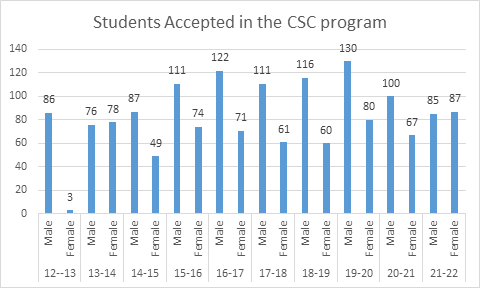
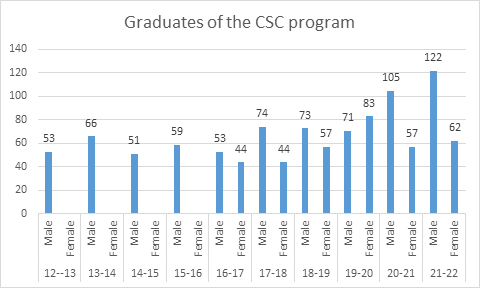
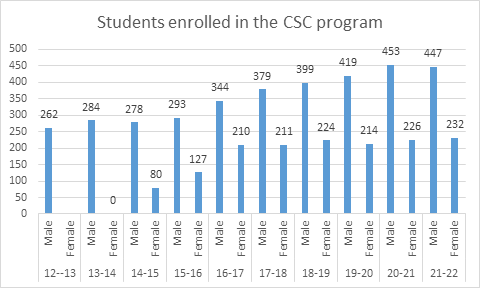
Course Catalog
Link


